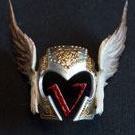Writing Tip Writing Tip: The Editing Process
So - glancing over some of the past newsletters, I found this gem from Feb 2007, about editing from a writer's perspective. I hope you enjoy!
Editors and Writers
The Editing Process: From the Writer’s Point of View
By Talon Rider
Finding an editor can be a problem sometimes. You think to yourself, where can I find someone? Do I ask another author who they use? Do I post something in a forum somewhere? Has an editor made their presence known? Either one of those methods may work. GA is making this step easier.
As an author, you need to be clear on what you are looking for from an editor. Do you want a minimal amount of editing done, such as spelling and punctuation, or something more serious like spelling, grammar, flow, plot, and character development, etc.?
Communication is the first and most important step. The author should provide the editor with a brief description of the storyline and provide a small sample of the story to give an editor an idea of the story. This may also help to pique the editor’s interest in the story.
The method that the editor uses should also be discussed. Does the editor use the “Track Changes” function in Word? Does the editor make the suggested changes in the document using different colors? With Track Changes, the editor can make the changes and leave a comment to the side, giving the author the option to accept or decline them.
The other method of editing can be time consuming. Here the editor may make changes within the document, typing them in a different color, showing the suggested changes, and then writing his comments elsewhere.
An editor who doesn’t explain the reasons behind the suggested changes isn’t helping the author, especially the new or beginning writer. In time, as the team works together, a one or two word reason may suffice.
Once the edit is complete and sent back to the author, the author should then review and decide how to proceed on the suggested changes. Once this step is complete, the author should send the story back to the editor for a second edit. The author should not be afraid to ask questions or to explain why a change was rejected. An important thing to remember is the editor helps the author fine tune the story. It is the author’s right to accept or reject any suggested changes to his/her work.
Once the author is satisfied with the editing portion, it is recommended that it be sent to some Beta Readers. The beta reader’s job is to give the author that all-important first feedback on the story before it’s released to the public. They will look into things like, flow, character development, plot, etc.






3 Comments
Recommended Comments
Create an account or sign in to comment
You need to be a member in order to leave a comment
Create an account
Sign up for a new account in our community. It's easy!
Register a new accountSign in
Already have an account? Sign in here.
Sign In Now